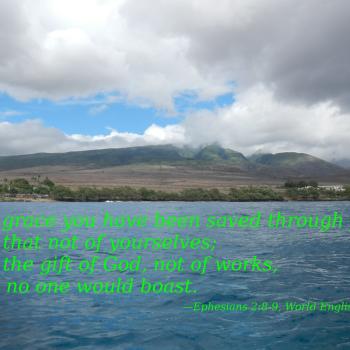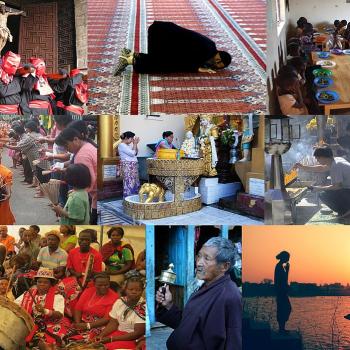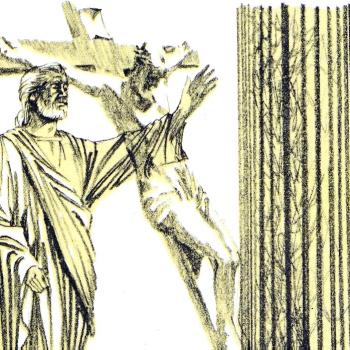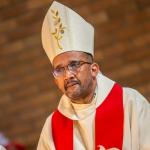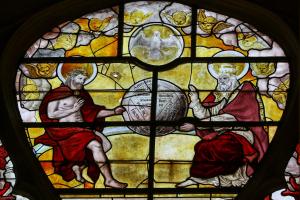
Humanity has had, and continues to have, many kinds of relationships with God. Many of them come from us and how we seek after and choose to understand God. For example, when we think of God as the creator, that produces all kinds of notions about God, notions which suggest our own relationship with God is primarily that of a created subject. Similarly, when we consider God as the absolute source and foundation of all things, we see the divine nature as representing absolute being; this suggests God deals with us as that absolute, that is, with absolute power, so that God rules over us and everything in the creation with unstoppable, and therefore, irresistible divine power. While these engagements with God are not completely wrong, they also do not provide us a full and proper understanding as to how God relates to us, and so, insofar as they miss the whole picture, they are not true. God certainly can be seen as the absolute, but that does not tell us how God actually acts, that is, it does not really tell us how God chooses to interact with creation. We can speculate as to what we think God would be like based upon the premise that God is the source and foundation of being. In doing so, we can conclude many things about God, such as God is good, but that is a philosophical-ontological conclusion. It does not tell us how God will act; we merely have the concept that God is good without knowledge what such good entails. We can only come to know that through God’s interaction with us, that is, by coming to see how God actually acts and engages us with those actions. Only God can tell us about God, only God can reveal the inner reality of the divine nature. This is what Christianity believes has been done throughout history but especially with Jesus, who is the God-man, that is, a divine person who became human in order to reveal to humanity the truths about God in a way we can apprehend them. “God gives himself to you as a man so that you can bear it, because you are unable to endure him as he is.” [1] In doing so, we find God has chosen to have a relationship with us (and the whole of creation); we do not relate to the divine nature merely as the absolute set apart from everything and everyone else, lording it over creation, but as one who loves what has been create. God interacts with creation not only as a creator, but as a loving parent: “When God changed himself from Lord into Father, he wanted to rule by love rather than power, and he preferred to be loved rather than to be feared; he warned us with fatherly affection not to lose anything from a very noble endeavor.”[2]
In the divine nature, God is not changing. God eternally is what God is, and what God is is what God does. That eternity is the eternity of love, as God is love. However, in relation to our temporal understanding of God, God changes for us, dealing with us in ways which in part meets our expectations, but also in ways which change them. We see this with the history of the people of Israel and their relationship with God. They had some expectations of God, among which, as one who wanted sacrifices in order to be appeased. God met them with those expectations, which is why initially, accepted sacrifices from them, but God did so in a way to limit them, so they can slowly be moved away from thinking God needed or desired such sacrifices. Eventually, God was able to show to them, through the prophets, that what God wanted was not any external sacrifice but rather, love, that is, the hearts of the faithful. And yet, because God allowed the people of Israel to use sacrifices, at least initially, God worked through them all kinds of symbols which would eventually help counteract such an understanding of God, symbols which relied upon the self-sacrificial nature of love. Such self-sacrifice must not be understood nihilistically, as if to prove our love to our beloved, we should annihilate ourselves from existence, but rather, for us to find a way to be self-transcending, to sacrifice who and what we think we are in order to become something greater, something better.
To give ourselves over to someone else, or to God, in love, requires us to accept that there is good in ourselves, for if we cannot accept that, then how can it be a gift when we give it to our beloved? And, as we give ourselves over to our beloved, and in doing so, die to ourselves, detach ourselves from all self-absorption which would prevent such self-giving love, we find we receive ourselves back from the beloved, not as we were, but in a new, transformed way, that is we become resurrected by love. This is what God intended us to understand through such symbolism, and to make the point, Jesus showed it to us through his life and death. Jesus showed the extreme love God had for humanity, a love which allowed Jesus, the God-man, to embrace the beloved with so much love, he was willing to be sacrificed and killed by his beloved, knowing that in doing so, the love which he embraced would have him raised in glory. God shows us the self-sacrificial nature of love, and in doing so, show us the inner nature of the divine nature and what that goodness entails. God is love, and so God does not come to us as an absolute power seeking to dominate and control but rather, gives everything over to creation through love so that creation can be raised up and share in the divine glory. Jesus shows us to accept the change which is necessary instead of staying trapped where one is, leading, though such attachment, a living death instead of life beyond death. And the more we follow the path of love, the more we will come to know God and God’s love, for the further along the path we are, the more we will be ready to see and experience greater and greater forms of love. In this way, it can be said that that various “veils” which God uses to hide the divine nature from us will slowly come off, until, in the eschaton, we will come face to face with God:
In the life beyond, indeed, we will receive the whole truth concerning God the creator—not about His nature but about the order of His majesty, and of His divine glory and His great love for us. There, all the veils and titles and forms of the Economy, will be taken away from before the mind; there, we will no longer receive His gifts in the name of our petition, nor the grace of knowledge in a measured way. In the life beyond, indeed, God will truly show that even in the requests made here below, He does not give what we request because of our petition, but He made the petition and intermediary. For He has clothed it in the form of words, bringing the mind to wander in the Essence of God and in the knowledge of His care for us. [3]
We will learn, truly, that all the changes which seem to take place in God are not changes in God, but in ourselves, allowing us to come closer and closer to God, to know God better and better, to know, indeed, that God truly is love and so rules in love instead of with mere power. This is not to say God does not possess that power, but to think of God along the lines of power is not truly to know God but only God as veiled within human conventions.
[1] St. Peter Chrysologus, Selected Sermons. Volume 2. Trans. Willam B Palardy (Washington, DC: CUA Press, 2004),97 [Sermon 23].
[2] St. Peter Chrysologus, Selected Sermons. Volume 2, 35 [Sermon 7].
[3] St. Isaac the Syrian, “The Third Part.” Trans. Mary T. Hansbury in An Anthology of Syriac Writers From Qatar in the Seventh Century. Ed. Mario Kozah, Abdulrahim Abu-Husayn, Saif Shaeen Al-Murikhi and Haya Al Thani (Piscataway, NJ: Gorgias Press, 2015), 309 [III.35].
Stay in touch! Like A Little Bit of Nothing on Facebook.
If you liked what you read, please consider sharing it with your friends and family!
N.B.: While I read comments to moderate them, I rarely respond to them. If I don’t respond to your comment directly, don’t assume I am unthankful for it. I appreciate it. But I want readers to feel free to ask questions, and hopefully, dialogue with each other. I have shared what I wanted to say, though some responses will get a brief reply by me, or, if I find it interesting and something I can engage fully, as the foundation for another post. I have had many posts inspired or improved upon thanks to my readers.








